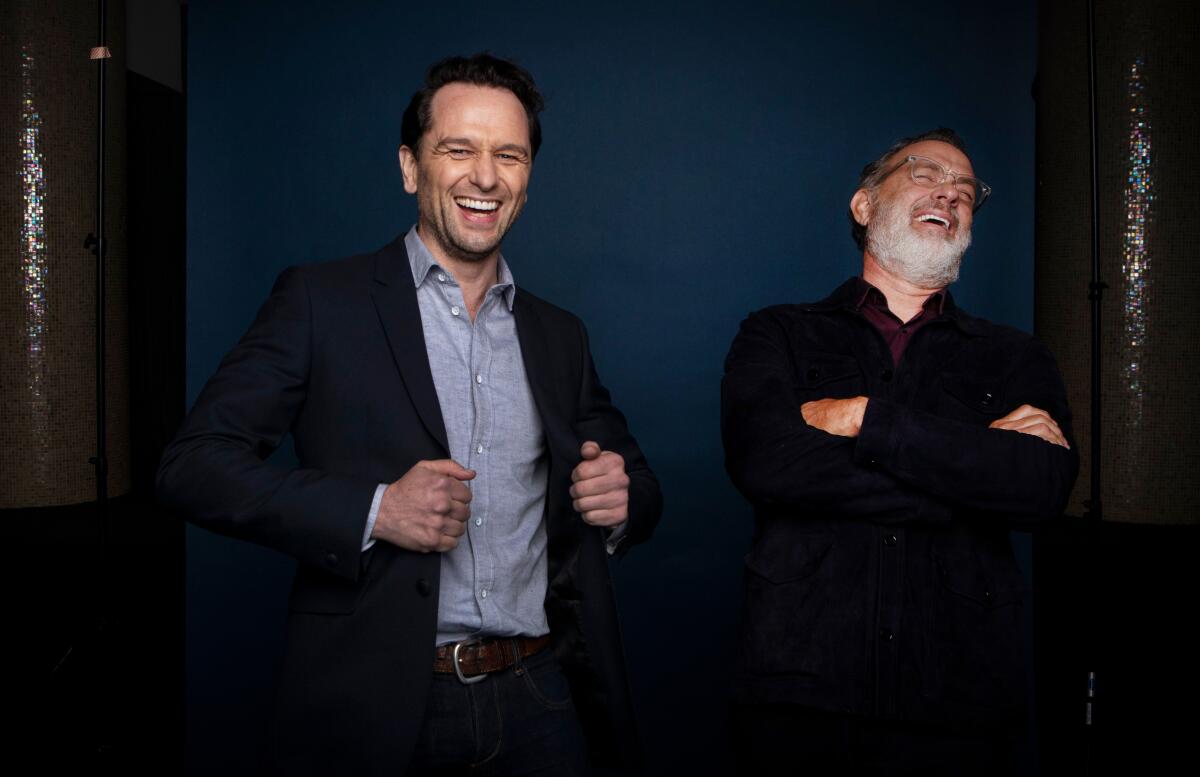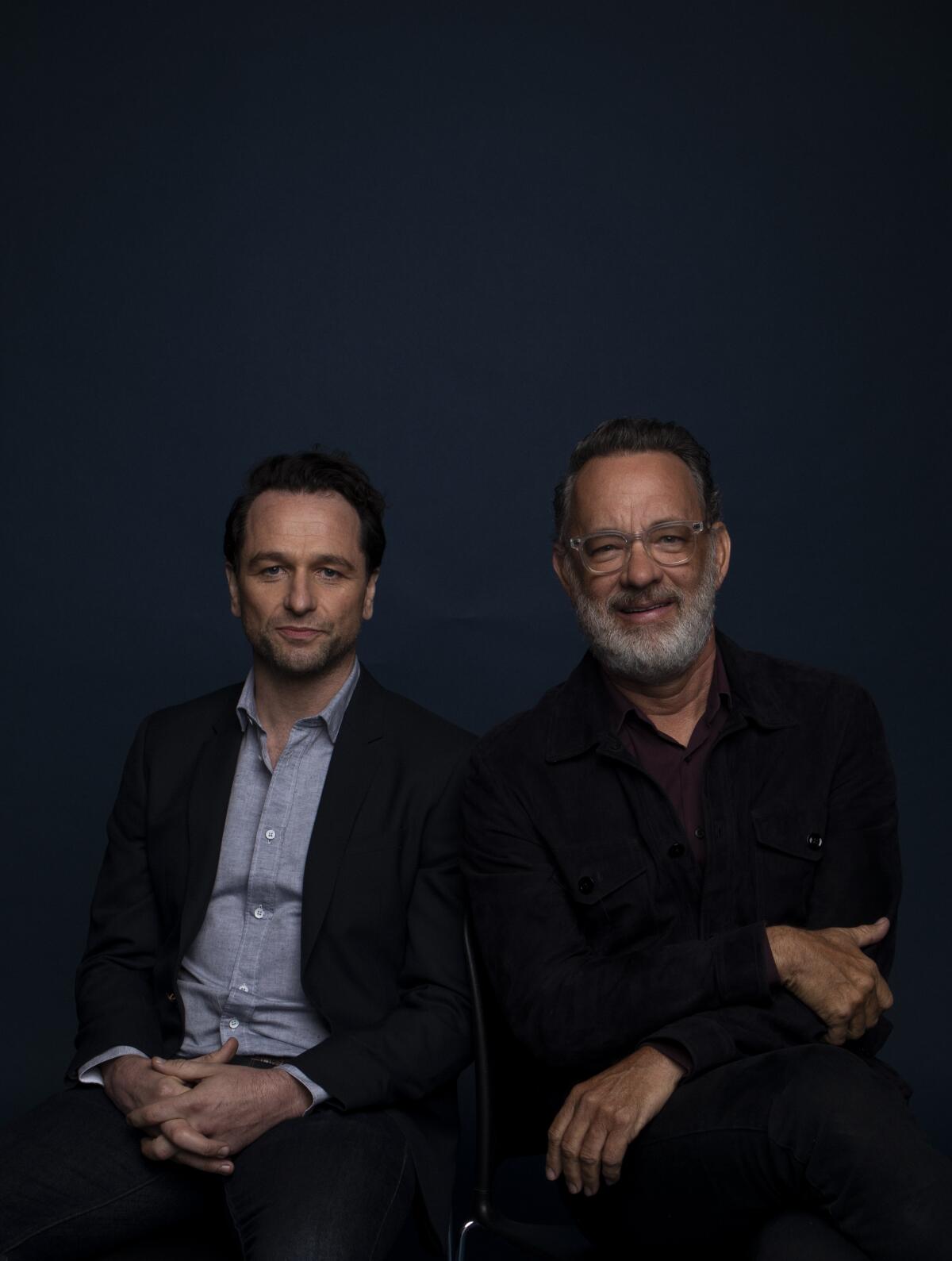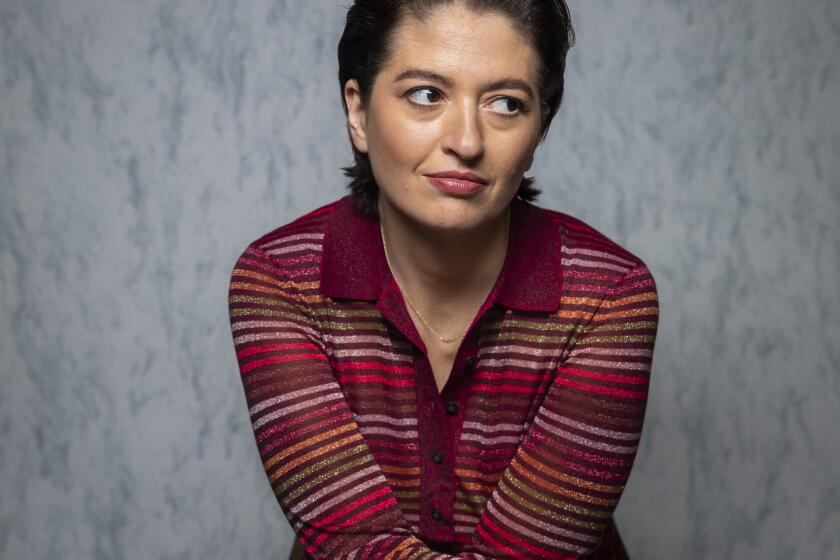What Tom Hanks and Matthew Rhys learned from Mister Rogers for ‘A Beautiful Day in the Neighborhood’

- Share via
Tom Hanks and Matthew Rhys don’t know what to do with the mad that they feel. The actors, who costar in the Mister Rogers movie “A Beautiful Day in the Neighborhood,” are shouting over each other like two kids squabbling for first rights to a slide at a playground, except they’re actually in a hollow conference room at a swanky West Hollywood design complex.
“I’m tired of living my life according to you!!” Rhys huffs at one turn, his Welsh accent sprinting through the words.
It’s all a performance, of course, from two affable actors trying to punch up another interview in their press blitz for the film. But gag or not, it gets them thinking about what Mister Rogers would have said if he bore witness to the screaming match — there’s talk of counting to four when there’s the impulse to roar. And then Hanks just goes for it.
“Sometimes people are mad/and they really do feel bad,” he begins to sing, channeling Rogers’ soft-and-steady tone while crossing his legs and mock-tying his shoes. “But the very same people who are mad sometimes/are the very same people who are glad sometimes.”
(Rhys, it should be noted, dutifully sang along.)
Almost no one needs reminding, at this point, that Hanks portrays the beloved children’s television host in the film — the casting garnered a collective swoon when it was announced last year. Rhys plays the unbelieving journalist tasked with writing a magazine profile of Rogers in the late ’90s.
“A Beautiful Day in the Neighborhood,” which opens Nov. 22, is directed by Marielle Heller (“Can You Ever Forgive Me?”) and is inspired by the 1998 Esquire article “Can You Say ... Hero?” by Tom Junod. Early critical reception following its September world premiere at the Toronto International Film Festival has been as warm and fuzzy as one of Rogers’ signature zip-up sweaters.
In a late-October interview, Hanks and Rhys talked about the heroism of Fred Rogers in contrast to those other superheroes of the big screen; who they held in that sort of reverence in their own lives; and learning how to set their cynicism aside. Here are edited excerpts from the conversation.
What was the typical response, early on, when you would tell people you were doing this movie?
Rhys: It was split for me because if I told people at home [in Wales] that I was doing a Mister Rogers film, they go, “Who’s Mister Rogers? Is it about that football player Aaron Rodgers?”
Hanks: Is that right?
Rhys: Yeah. Because that was the closest reference they have. The football player?
Hanks: The quarterback for the Green Bay Packers.
Rhys: They’d be like: “Do you play a linebacker of sorts?” I’d go, “No.” But, no, then you say, “With Tom Hanks.” They understand that reference. In this country, you say you’re doing a movie about Mister Rogers with Mr. Hanks and it elicits quite an emotive response for many reasons.
People just melt.
Rhys: Yes. But you can understand. I mean, the pairing of those two, Tom Hanks as Mister Rogers, is pretty remarkable.
Hanks: Most people thought it was a biopic. They thought, “Oh, a grand history of Mister Rogers.” When I read Tom Junod’s article, and I realized, “Oh, Tom was that journalist, oh, dear, oh, that’s really different” ... At the end of the day, man, you just hope you can surprise this audience somehow because they’re getting this [points to Matthew] and they’re getting this [points to himself]. If there’s not a surprise in there, we’re just absolutely doomed. Hopefully, there’ll be something in there that [the audience] didn’t expect as opposed to just an ongoing [begins singing]: “Sometimes people are sad...”
What were your perceptions of Fred Rogers before you started and how did that change? There’s this idea that he is this saint-like figure, and then you have others that view him as this fraud.
Hanks: There’s an old story that he actually has a bunch of tattoos because he was a Navy SEAL during Vietnam.
Rhys: I love that one.
Hanks: Wouldn’t that be a great thing? I would have said, “Yes, of course, I was. I killed a VC with my bare hands.” But in terms of who he was, you have to go, I think, to the show itself. The show itself is very easy to treat as an acid trip by way of ... What is he trying to do? Is there a mind game that’s going on? Is it just a big, huge, tremendous feint? [Matt], did you watch a lot of the shows just in order to get an idea?
Rhys: Yeah. Tons, tons, tons.
Hanks: I watched a ton. Hours and hours. Look, the show was on when I was maybe 11, 12, 13 years old. I just thought it was odd. The puppets, their mouths didn’t move. What are these odd songs he keeps trying to sing all the time? I was probably more in tune with all the imitations of him, the comedy bits about him.
I didn’t realize that that show was a very specific sort of work that is not meant for us. If you have any reason for cynicism in your outlook, you cannot watch that show and not just have cynicism completely take over. ... The thing that no one could quite believe is that the purpose [of the show] was good — the purpose was to make little kids feel safe. [There was a belief] that somehow ... there’s got to be something nefarious about that, there’s got to be something sleazy. Who takes that mantle upon themselves and guards it and keeps working at it?
[When he was asked] why did you stop doing your show, he said, “Well, because we had really talked about everything.” He’s talking about his output as a canon that can exist again and again and again for any kid who’s 2 to 3 years old. That’s profound. I don’t think people trust that. They don’t buy it.
Matt, how was that for you to view through the lens of a father to a young son now?

Rhys: Not to sound like the walking commercial, but I was slightly staggered. One of the things that’s come up a number of times in the research part was when the kids would say, “He’s talking to me.” About three episodes in, Sam, my 3½-year-old said, “He’s talking to me.” That’s when a number of things made sense: the pauses, the deliberate tone of speech, which are very thought through.
I was learning stuff, before I even read the script, in “Daniel Tiger’s Neighborhood.” I was going, “Oh, that’s a good idea. I should do that. I really should do that.” All these clicks starting to happen, cogs turned. [My partner] Keri [Russell] is watching the show with Sam, and it’s like having the child psychologist in the room. As we both count to four before we roar. I have cynicism and pessimism in abundance ... but what I’ve seen purely with my own son with regard to this show has staggered me.
Hanks: I wish I had watched Mister Rogers with all my kids when they were young. I recently was with my granddaughter, who is literally Mister Rogers’ target audience. Her mom went off and was going to be back, and when [my granddaughter] woke up she says, “Where’s Mommy? Where’s Mommy?” I said, “Mommy is going to be back after lunch. I’m going to keep you safe and take care of you until she comes back.” She went, “Oh, OK.” Literally. No tears. It was that weird thing of, “I am going to take care of you and you are going to be safe.” After that, we made pancakes. That was it.
Mari [Heller] said an interesting thing, because she and her son watched Mister Rogers together. She said adults have a tendency not to give a kid a second. It’s a constant: “Hey, are you enjoying school? What’s your special class? Do you play baseball? Is it fun to play baseball?” And the kids are like: “Would you shut up and let me answer your question?”
For her third feature film, director Marielle Heller convinced Tom Hanks to play Fred Rogers in ‘A Beautiful Day in the Neighborhood’ and hopes to reconnect audiences with how they felt as kids.
Rhys: That’s the big one I’ve taken from him — the listening and the taking of the frenetic out of this daily life that we bombard them with. [Fred’s] ability, just in any situation, to kind of gauge the empathy needed or the understanding was an incredible tool.
Hanks: The grownups — the people particularly at [public television station] WQED — they all said, when you were talking to Fred you felt as though there was no one else in the room or the world that he was interested in. I think there were times when that could be an autopilot that he did by rote, but I think that was not the majority of the time. I think his nature was to be curious about people and to listen. ... I think that’s one of the reasons why people felt as though, “Why, I just had the most magnificent talk with Mister Rogers. I feel so great.”
The film very much feels like this adult version of “Mister Rogers.” Fred is asking these questions and, as a moviegoer watching it all, you find yourself thinking about what he’s asking. Did you find yourself reflecting on yourself as you were making it?
Hanks: I was surprised that we went there. I was surprised, delighted, that Mari went there. Right down to that scene in the Chinese diner [that involves a prolonged silence]. We can talk about it without giving it away. But when we were shooting that, I actually looked at Mari, I said, “You are so ... badass. Are you really going to do this?” I said, “Now look, I understand. If it works, you can use it. If it doesn’t work, you don’t have to use it. But are we really going to do this right now?” She said, “Yes, we are.” And I said, “I hope I can make it through it.” That was just my side of it.
Rhys: That was one of your first scenes, wasn’t it?
Hanks: It was one of the first. ... Yeah, yeah. And we didn’t do many takes.
Rhys: It’s one of the rare moments, rare moments in a film where you’re asked to emote and you’re not pulling yourself out of the scene and thinking of something else in order to do it. You’re absolutely present to the question that’s just been asked, and the response or reaction is to the character who just asked. It was a first for me.
Hanks: It was so palpable. It’s like ducking and the director is actually going to fire a machine gun over your head. We’re not going to pretend. And you’re like, “Are you insane? ... I hope it works!” I can’t talk about Mari enough.

What place does a hero of Fred’s nature, somebody who is kind and pure and patient, have in the cinematic universe that leans heavily on heroes with superpowers?
Hanks: Authenticity has not been the coin of the realm for a long, long time, and yet there’s no substitute for it. It’s hard. There’s rules that you follow. You’ve got to have something happen on page seven and there’s that act break and ding-a-ding and blah, blah, blah ... The audience has to know exactly what’s going on every single second of the way.
Then we have this story by these two guys [screenwriters Noah Harpster and Micah Fitzerman-Blue] and directed by [Heller] that says, “No, we’re not going to follow those rules here.” It’s like, “Oh, you’re not going to follow the rules? We’re doomed.” I was talking to a guy just now, forgive me, but he was saying, “Why do you think this movie resonates so much now?” And I said I haven’t the vaguest idea because we were not making a movie that was meant for today. It just happened to be this thing.
I think anytime you’re like, “This is an important movie that people need to see,” well, I’m going to avoid that dog. Oh, it’s an important thing we need to see? I’ll just take my medicine right now. It has to be this thing that’s sort of sneaks up on you. In some ways, authenticity is a stilted beast.
Is there someone you view with the same reverence people had for Fred Rogers?
Hanks: I watched David Letterman in that way. The show that he put on, to me, was not just a late-night talk show; it was an encapsulation of our times ... it captured the emotional zeitgeist . Oddly enough, I always felt Dave’s humor was not cynical, it was honest, and it would comment on the hypocrisy in a way that was barbed at the same time it was extremely witty. I would study those shows, and not because I got to figure it out what he’s doing but because it was, “This is a miraculous presentation of who we are.” If I was 2 years old then, Dave would have been my Fred Rogers.
Rhys: My Fred was a director of the youth theater that I worked at. He was just someone who kind of very gently pushed us into kind of very simply thinking more. It was a very simple message to stop and think more, and I’ve always kept that with me.
TIFF Critics Notebook: ‘A Beautiful Day in the Neighborhood,’ ‘Uncut Gems’ shake up festival rhythms
Tom Hanks, Adam Sandler and Mariana Di Girólamo deliver memorable performances in TIFF 2019 highlights.
More to Read
Only good movies
Get the Indie Focus newsletter, Mark Olsen's weekly guide to the world of cinema.
You may occasionally receive promotional content from the Los Angeles Times.












